I stood in my kitchen last week, staring at my coffee maker and a box of tea bags, frozen. Coffee or tea? It sounds so silly, but my chest got tight, my brain started spinning, and I couldn’t pick one. “What if coffee makes me jittery?” I thought. “But tea’s kinda boring today.” Ten minutes later, I’m still standing there, no drink in hand, feeling like I’m failing at life over a beverage. 😅 decision-making anxiety !
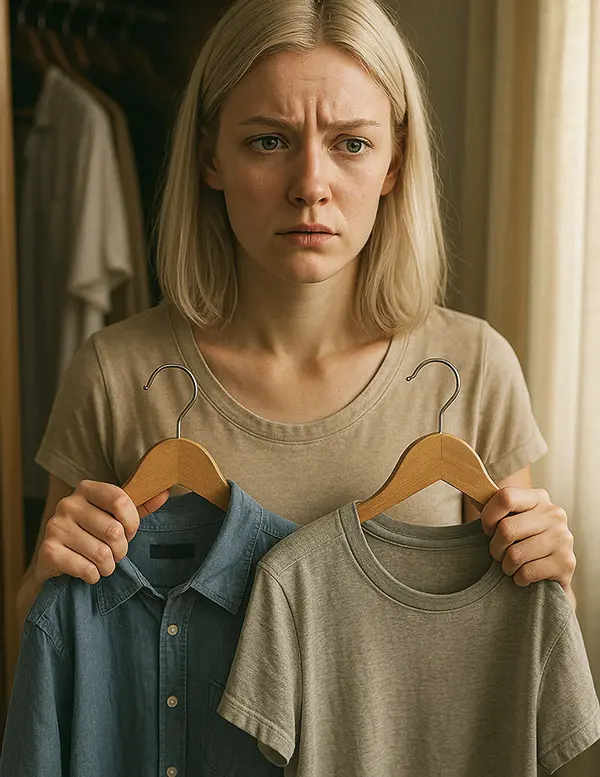
If you’ve ever felt paralyzed by small choices like what to wear, what to eat, or even which show to watch you’re not alone. This quiet panic, where even tiny decisions feel like climbing a mountain, is super common, especially in your 20s and 30s when life’s already a whirlwind. Why does choosing a shirt feel like a life-or-death moment? Are you just overthinking, or is something deeper going on?
In this article, we’ll dive into why decision-making can spark anxiety, what it’s called (hint: decidophobia), and how to gently rebuild your confidence to make choices without freaking out. With real stories, science, and practical tips, we’ll help you see that imperfect decisions are still progress. Ready to stop freezing and start choosing? 😊 Let’s do this!

Mental Wellness Test
Where Does Your Mind Need the Most Support?
Discover your emotional health in under 4 minutes.
Find out if what you’re feeling is:
burnout, anxiety,trauma
or just too many open tabs in your brain.
No pressure – Just clarity
What Is Decision-Making Anxiety?
Decision-making anxiety is that overwhelming feeling when even simple choices like what to eat or wear make your heart race or your mind spin. It’s not just being indecisive; it’s a deeper fear that can leave you stuck, unable to move forward. Sometimes called decidophobia, it’s a specific phobia where the thought of making a decision, big or small, triggers intense anxiety or distress.

According to Verywell Mind, decidophobia involves:
 Struggling with everyday decisions, like picking a meal or outfit.
Struggling with everyday decisions, like picking a meal or outfit. Feeling paralyzed by bigger choices, like jobs or relationships.
Feeling paralyzed by bigger choices, like jobs or relationships. Avoiding decisions to dodge the fear of being “wrong.”
Avoiding decisions to dodge the fear of being “wrong.” Physical symptoms like a tight chest, sweating, or racing thoughts.
Physical symptoms like a tight chest, sweating, or racing thoughts.
What is decidophobia? Coined by philosopher Walter Kaufmann in 1973, it’s the irrational fear of making decisions, often tied to perfectionism or past experiences where choices led to pain. It’s not just you about 20% of people report significant anxiety around decision-making, per a 2020 study in Behavioral Sciences. It’s like your brain’s stuck in a loop 😣 trying to avoid a mistake that might not even matter.
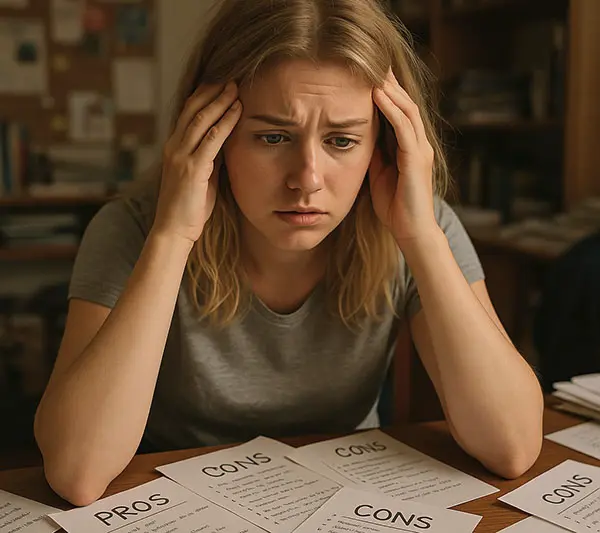
Why Small Decisions Feel Huge
So, why does picking a shirt or a lunch order feel like a high-stakes mission? It’s not just about the choice itself it’s what your brain’s doing behind the scenes. Here’s why small decisions can feel massive:
- Perfectionism: If you’re a perfectionist (like me), you might think there’s a “right” choice, and picking the “wrong” one is a failure. I’d agonize over which email to send first, worried I’d mess up my whole day.
- Fear of Regret: Your brain imagines worst-case scenarios, like, “What if I pick tea and regret not having coffee?” This fear of regret can paralyze you, per Healthline.
- Past Trauma: If past decisions led to criticism or pain like being judged for a choice as a kid your brain might see all decisions as risky. A friend grew up with a parent who nitpicked every choice, and now she freezes over simple stuff.
- Overthinking: Am I just overthinking everything? Yup, often. Overthinking is your brain’s attempt to protect you from pain, but it makes decisions feel like life-or-death moments.
- Loss of Control: Anxiety can make you feel like you’re not in charge, so even small choices feel overwhelming. I felt this when I couldn’t decide what to cook it was like my brain was saying, “You can’t handle this.”
- Too Many Options: With endless choices (thanks, modern life), your brain gets overloaded. A 2019 study in Journal of Consumer Psychology found that too many options increase decision anxiety.

“The more choices we have, the more likely we are to feel overwhelmed.”
Barry Schwartz, The Paradox of Choice
Why do I panic when making decisions? Your nervous system might confuse choices with risk, especially if you’ve faced trauma, perfectionism, or a need for control. It’s not about the coffee 😊 it’s about your brain trying to keep you safe.
The Science Behind Decision Paralysis
Let’s get nerdy for a sec. Decision-making involves your brain’s prefrontal cortex, which handles planning and judgment, and the amygdala, which processes emotions like fear. When you’re anxious, the amygdala can hijack the prefrontal cortex, making rational choices harder. PMC explains that anxiety narrows your focus and increases risk aversion, leading to avoidance or paralysis.
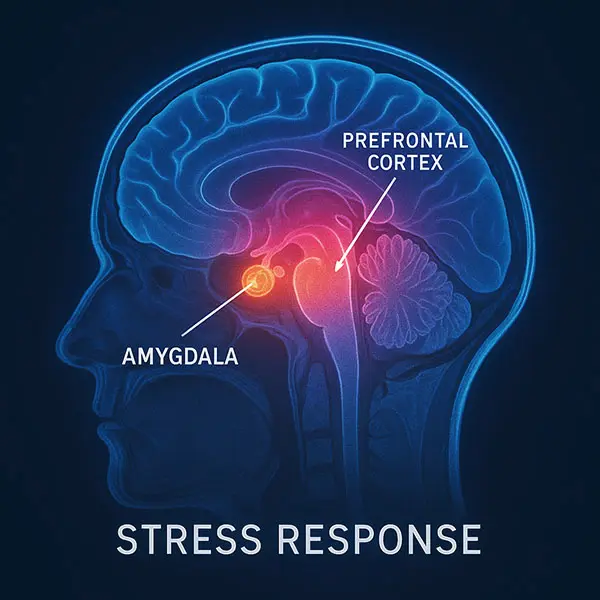
Chronic stress floods your system with cortisol, keeping you in fight-or-flight mode. This makes even small decisions feel like threats, as your brain’s wired to avoid danger. A 2021 study in Neuroscience & Biobehavioral Reviews found that high cortisol levels impair decision-making by over-activating the amygdala. It’s like your brain’s stuck in a “what if I mess up?” loop, even over something as simple as picking a shirt.
For some, this ties to conditions like OCD or ADHD, where indecision is a common symptom. But even without a diagnosis, stress or past experiences can make your brain treat choices like landmines. 😅
Decision Anxiety in the LGBTQ+ Community
For folks in the LGBTQ+ community, decision-making anxiety can hit harder due to unique pressures. Choices like coming out, navigating gender expression, or picking safe social spaces carry extra weight because of societal stigma or rejection risks. A friend who’s queer said they’d freeze over simple decisions like what to wear, worried it might signal their identity in a way that felt unsafe. This added layer of hypervigilance can amplify decision paralysis.
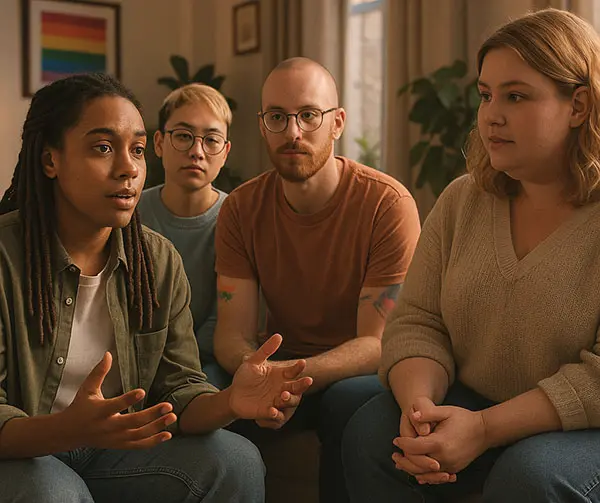
Finding affirming spaces like queer-friendly therapists or online communities can help. A 2022 study in Journal of LGBTQ Issues in Counseling found that supportive environments reduce anxiety around identity-related decisions. If you’re part of the community, connecting with others who get it can make choices feel less daunting. 😊
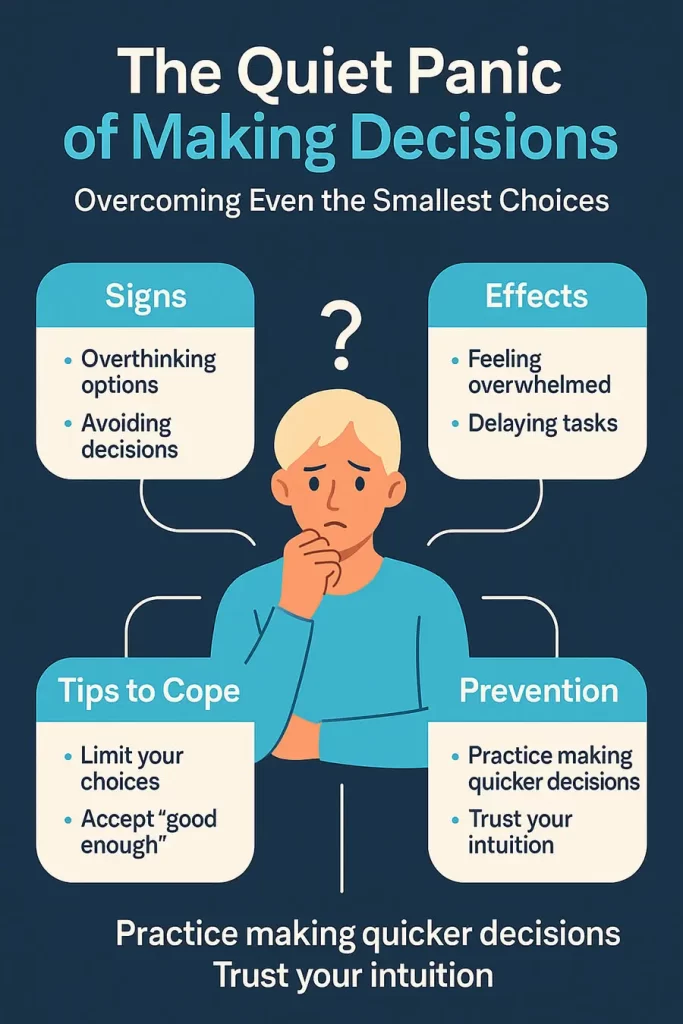
How to Rebuild Decision-Making Confidence
How to stop panicking and make a decision? It’s not about forcing yourself to choose it’s about retraining your brain to see decisions as safe. Here are practical ways to rebuild confidence, based on expert advice and my own trial-and-error:

- Accept Imperfect Choices: Remind yourself that few decisions are permanent. Most choices, like what to eat or wear, can be changed later. I started saying, “It’s just lunch, not a life sentence,” and it helped.
- Practice Low-Risk Decisions: Start with small choices, like picking a movie or a snack. I’d choose a dessert in 10 seconds, and it felt like a tiny win.
- Set Time Limits: Give yourself 30 seconds to decide on small stuff. Psych Central says this cuts overthinking. I tried this at a café and picked a drink without spiraling.
- Use a Coin Flip: Flip a coin not to decide but to reveal your gut instinct. If you’re bummed by the result, it shows what you really want. I did this for a weekend plan, and it clarified my preference.
- Affirm Your Choice: Say, “Any option I choose can work.” It shifts focus from “right” to “good enough.” I say this when picking outfits, and it’s weirdly freeing.
- Journal Your Decisions: Write down what you chose and how it went. I started tracking small choices, and seeing they didn’t ruin my life built confidence.
- Practice Self-Compassion: If you freeze, don’t beat yourself up. Say, “It’s okay, I’m learning.” Kristin Neff says this reduces anxiety.
Objection: “These won’t work I’m too anxious.” I hear ya when you’re stuck, nothing feels doable. But start with one tiny choice, like picking a song to play. It’s not about perfection it’s about progress. 😊
Ultimate Mental Wellness Test: Discover Emotional Health Just in 3 Min
Ever wonder where you stand with your mental health? That’s where our quick question Mini Mental Health Check comes in. It’s like a quick peek into your brain, giving you insights into your anxiety, burnout, and self-esteem levels.
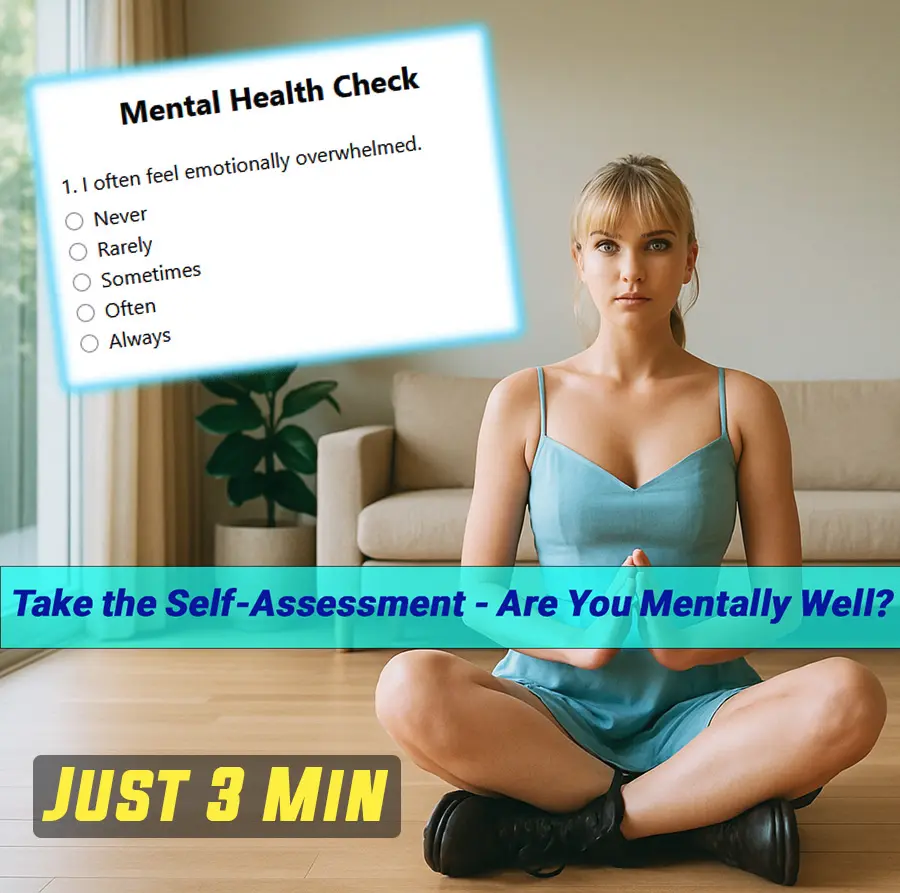
Real Stories: Breaking Free from Decision Paralysis
Let’s make this real with some stories (names changed for privacy):
- Maya: “I’d panic over what to order at restaurants, worried I’d regret it. My therapist suggested setting a 30-second timer. It’s helped me choose faster and feel less stressed.”
- Liam: “Growing up, my parents criticized every choice, so I froze over decisions. I started practicing small choices, like what to cook, and it’s getting easier.”
- Sam: Sam, who’s queer, struggled with decisions about coming out at work. “I was terrified of picking the ‘wrong’ time. Joining a support group helped me feel safe enough to choose.”
These stories show that decision paralysis is common, but small steps can lead to big changes. 😊
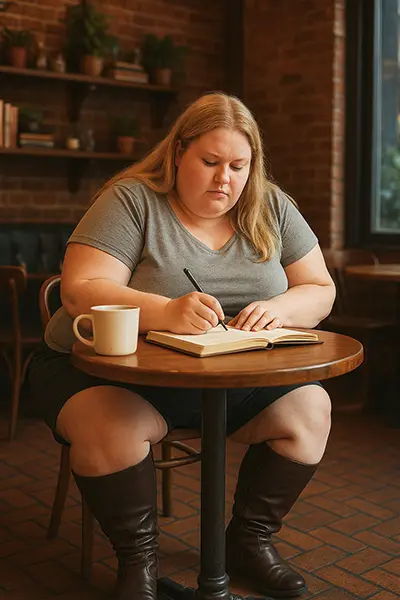
Ultimate Mental Wellness Test: Discover Emotional Health 3 Min
Ever wonder where you stand with your mental health? That’s where our quick question Mini Mental Health Check comes in. It’s like a quick peek into your brain, giving you insights into your anxiety, burnout, and self-esteem levels.
👉🏻 Ultimate Mental Wellness Test: Discover Emotional Health 3 Min
When to Seek Help
If decision anxiety is messing with your daily life w ork, relationships, or even basic tasks it’s time to talk to a pro. Signs include:
- Constant panic or paralysis over choices.
- Avoiding decisions altogether.
- Physical symptoms like chest pain or dizziness.
- Feeling worthless or incapable because of indecision.
A therapist can help unpack root causes, like trauma or anxiety disorders. NAMI recommends cognitive behavioral therapy (CBT) for managing decidophobia. I saw a therapist when I couldn’t choose a career path, and it helped me see my fear was tied to perfectionism, not failure. Reaching out’s a win, not a loss

Conclusion
The quiet panic of making decisions even small ones can feel like a trap, but it’s not a life sentence. Whether it’s perfectionism, past trauma, or just too many options, you can rewire your brain to see choices as safe, not scary. Start small, give yourself grace, and remember: your worth isn’t tied to perfect decisions. Every choice, even the “wrong” one, is a step toward confidence. So, next time you’re stuck between coffee or tea, take a deep breath and pick one. You got this. 😊
Struggling with decisions? Try one small choice today like what to eat for lunch and share how it went in the comments. Let’s break the panic cycle together!

Related resources
- Verywell Mind: Defines decidophobia the intense fear of making decisions and offers symptoms, causes, and coping strategies
- Healthline: Covers decision-making anxiety and decision fatigue, including signs like procrastination, impulsivity, and strategies to reduce mental overload
- Psych Central: Discusses chronic indecision, its links to anxiety and depression, and provides practical coping tips
- NAMI: Offers perspective on shared decision-making in mental health care empowering involvement in treatment choices
- PMC (PubMed Central): A neuroeconomic review exploring how anxiety impairs decision-making processes in the brain
Don’t miss the related articles
- Why Can’t I Turn My Brain Off? Dealing with Overthinking at Night
- The Guilt That Comes With Saying No
- Setting Digital Boundaries Without Feeling Like a Jerk
- What Is Emotional Self-Care and Why You Probably Need It
- Self-Care in Relationships: What Does That Even Mean?
Your nervous system might see choices as risks due to anxiety, perfectionism, or past trauma, triggering a fight-or-flight response even for small decisions.
It’s called decidophobia, an irrational fear of making choices that can cause intense anxiety or paralysis, even over simple decisions.
Set a time limit, practice small choices, and remind yourself that most decisions can be adjusted. Deep breathing or mindfulness can calm your nerves.
Anxiety, perfectionism, too many options, or past negative experiences can make decisions feel overwhelming, leading to avoidance or paralysis.
Build confidence with low-risk choices, accept imperfect decisions, and use tools like coin flips to reveal your instincts. Therapy can help too.
This term seems to be a typo likely meant to be decidophobia, the fear of making decisions, which causes anxiety and avoidance.
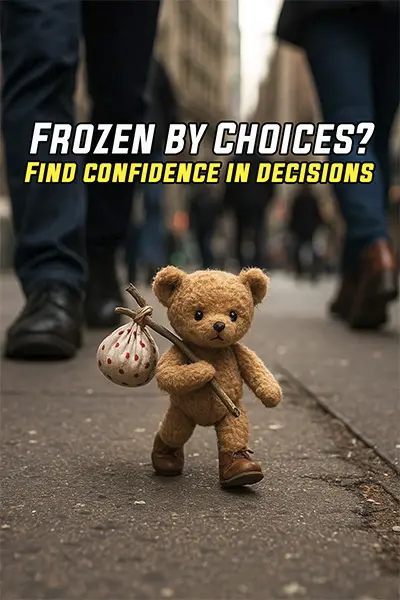
How to Start Making Decisions with Confidence
How to Start Making Decisions with Confidence
- Identify Your Triggers
Notice when decisions make you anxious specific situations or people?
- Start Small
Pick one low-risk choice daily, like what to eat or wear.
- Set a Timer
Give yourself 30 seconds to decide on small stuff to cut overthinking.
- Use a Coin Flip
Flip a coin to reveal your gut instinct, not to decide.
- Affirm Your Choice
Say, “This choice is good enough,” to ease pressure.
- Journal Outcomes:
Write down what you chose and how it went to build trust.
✨ Last updated on 08.08.2025
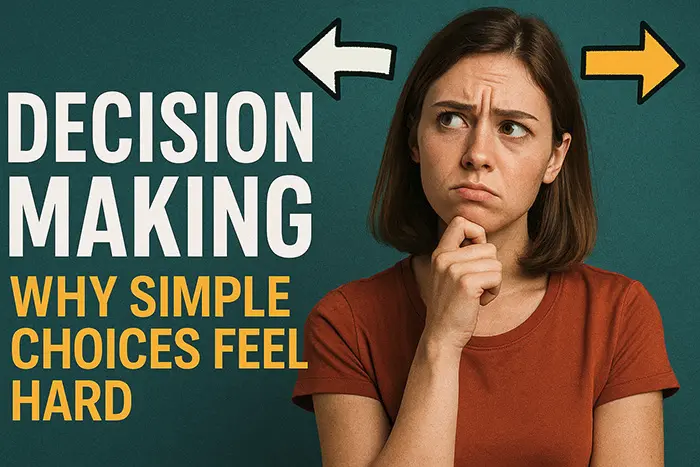
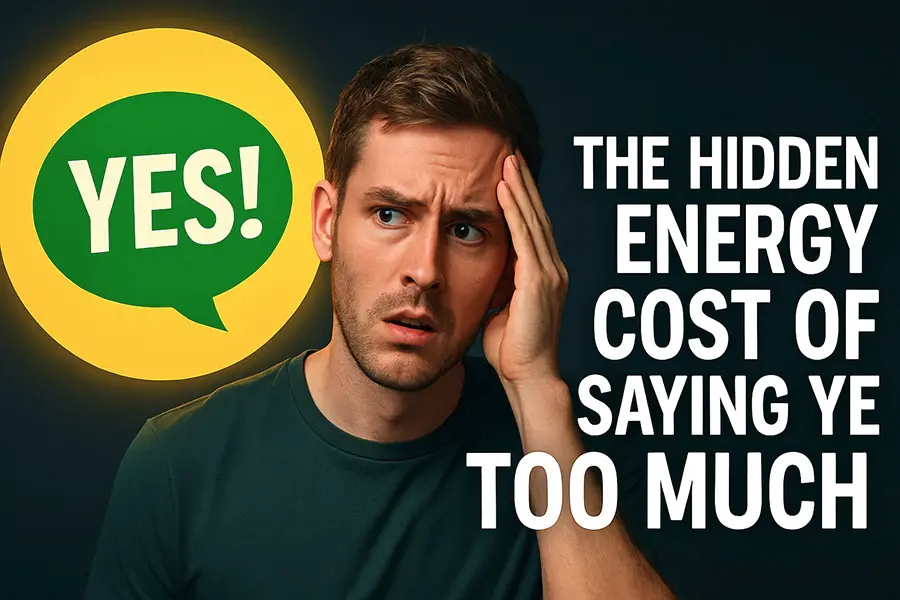
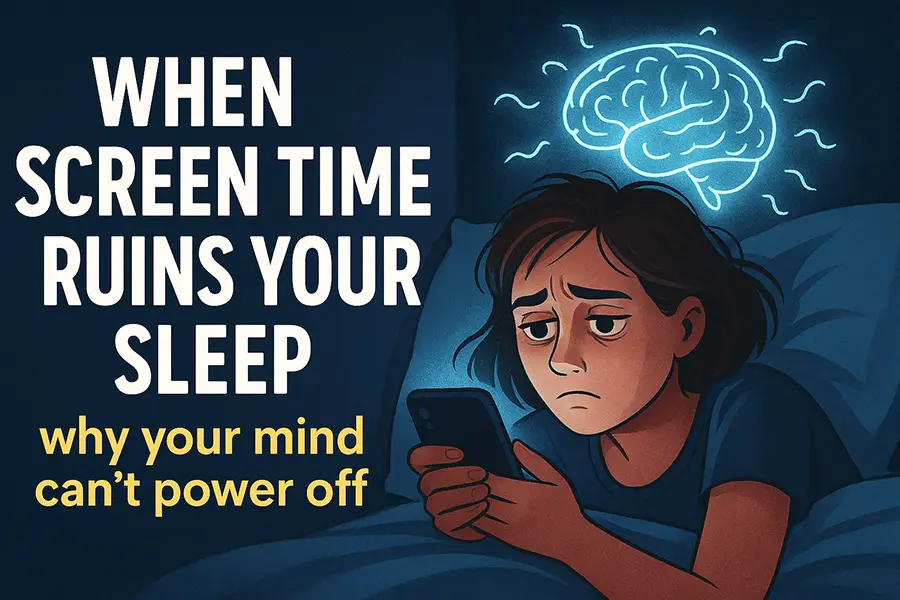
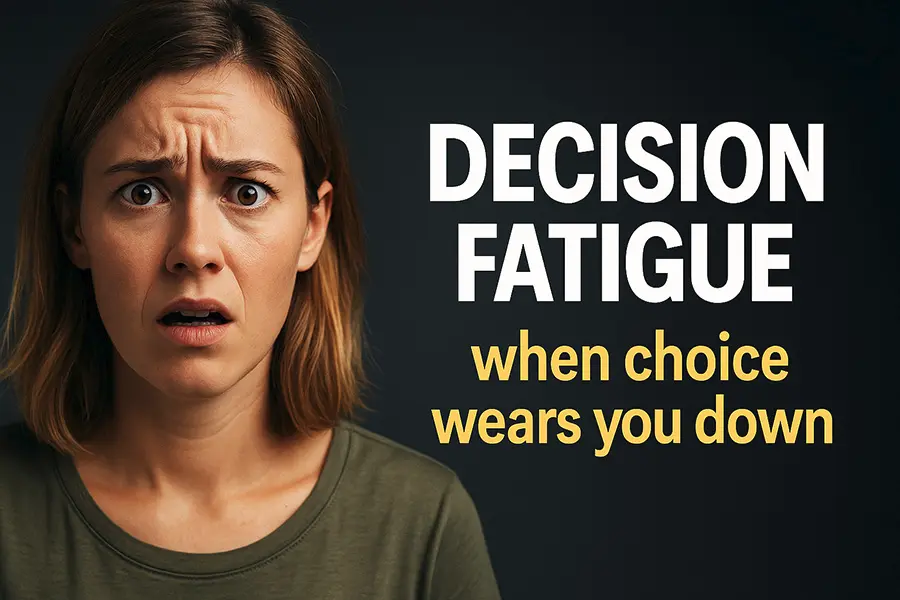
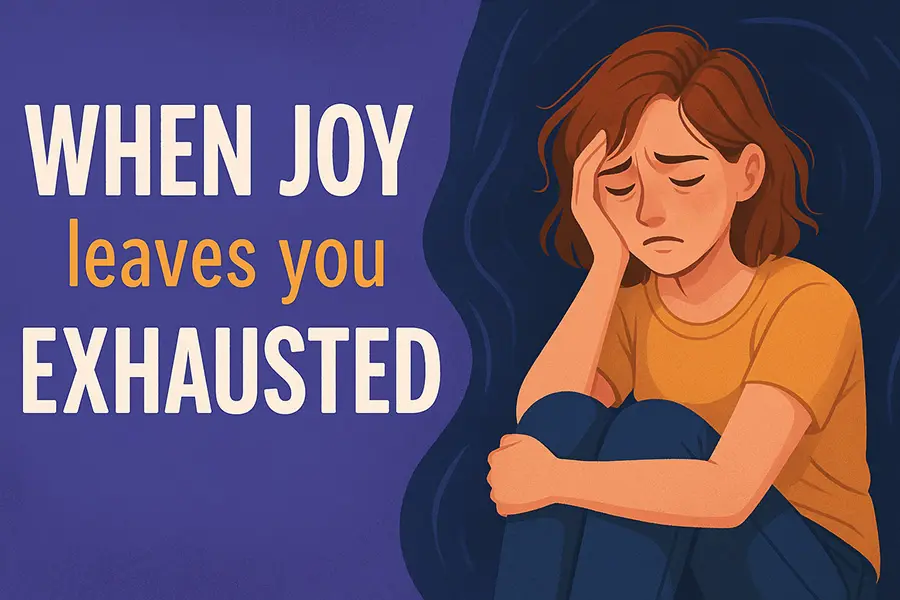
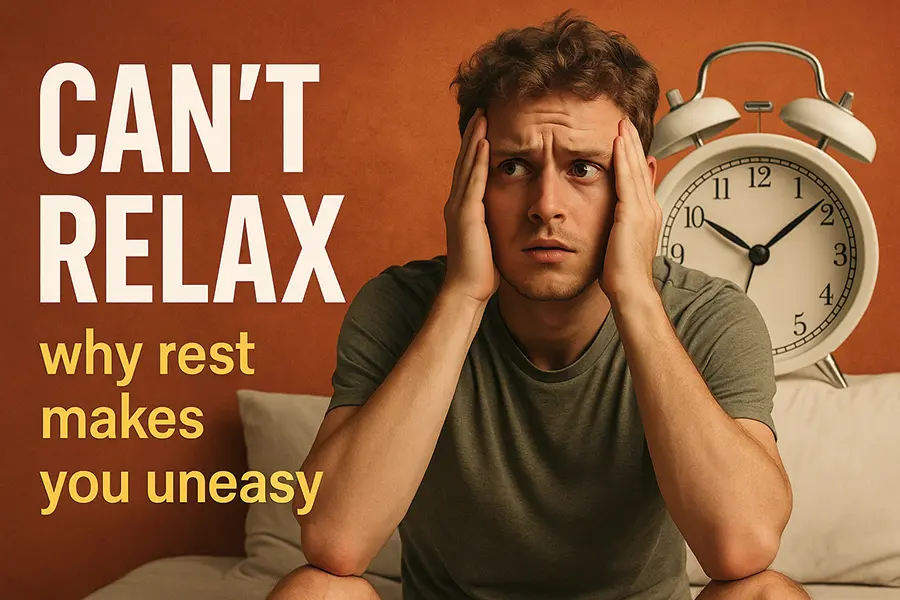
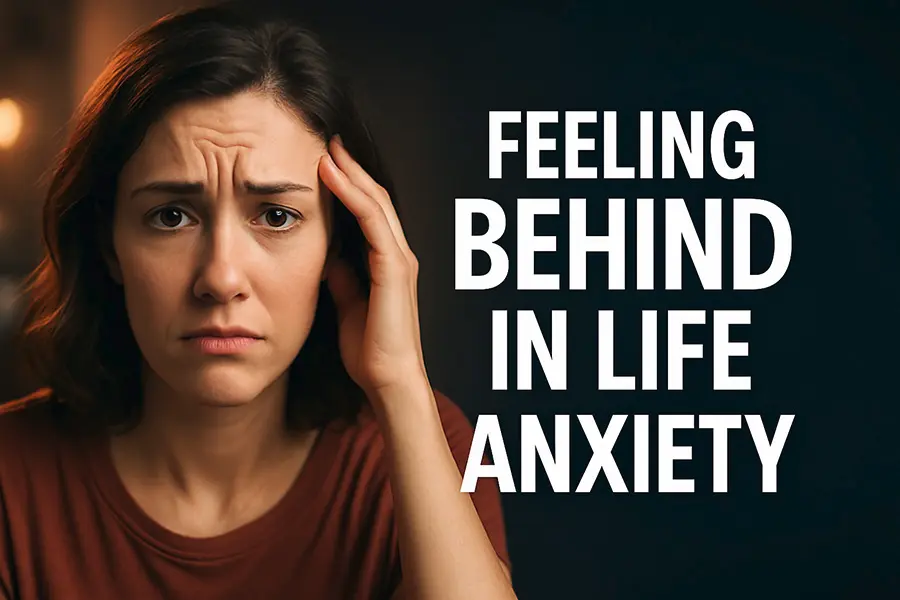
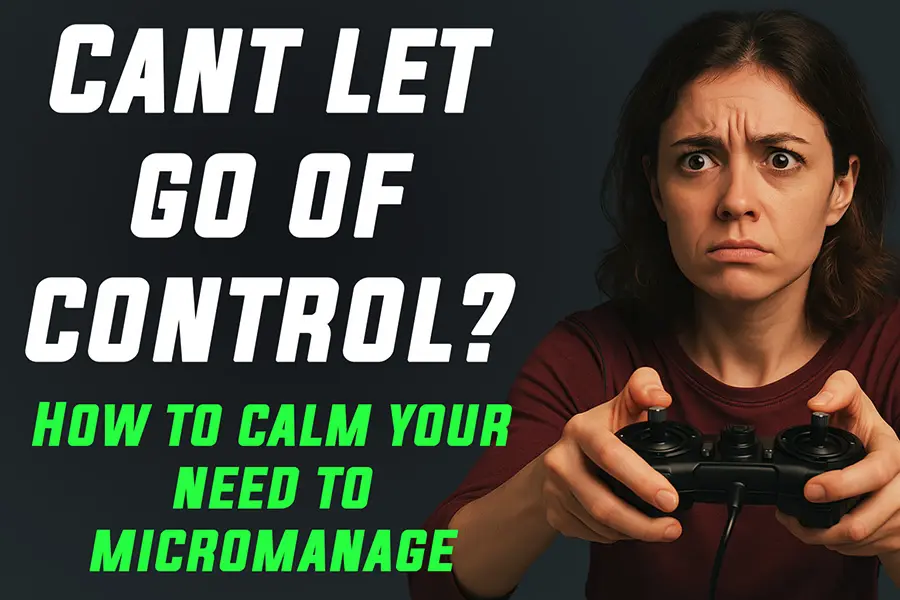
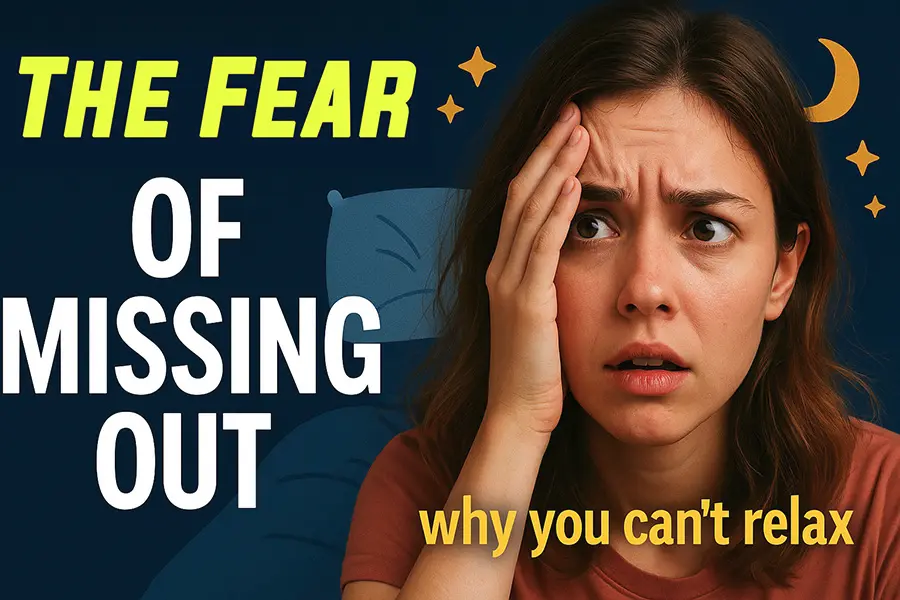
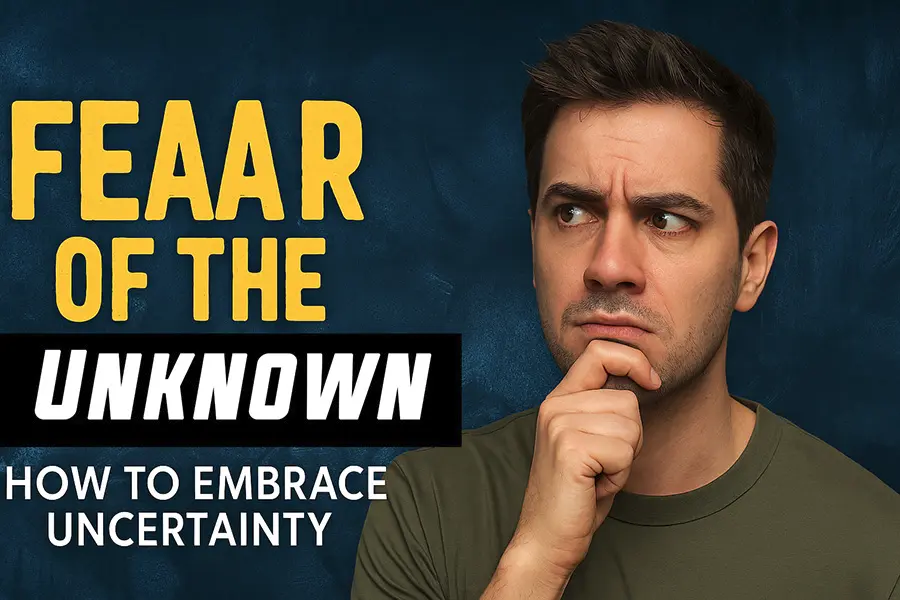
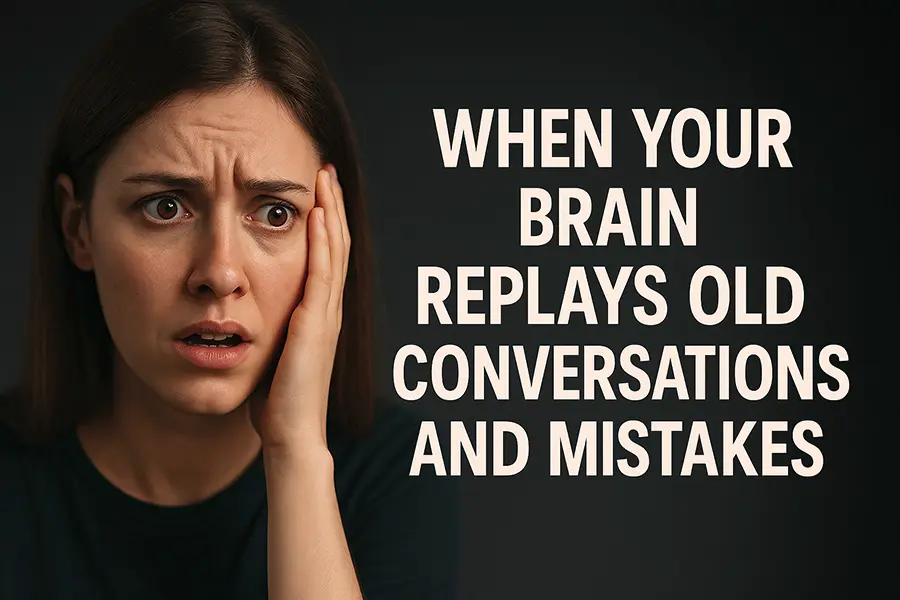
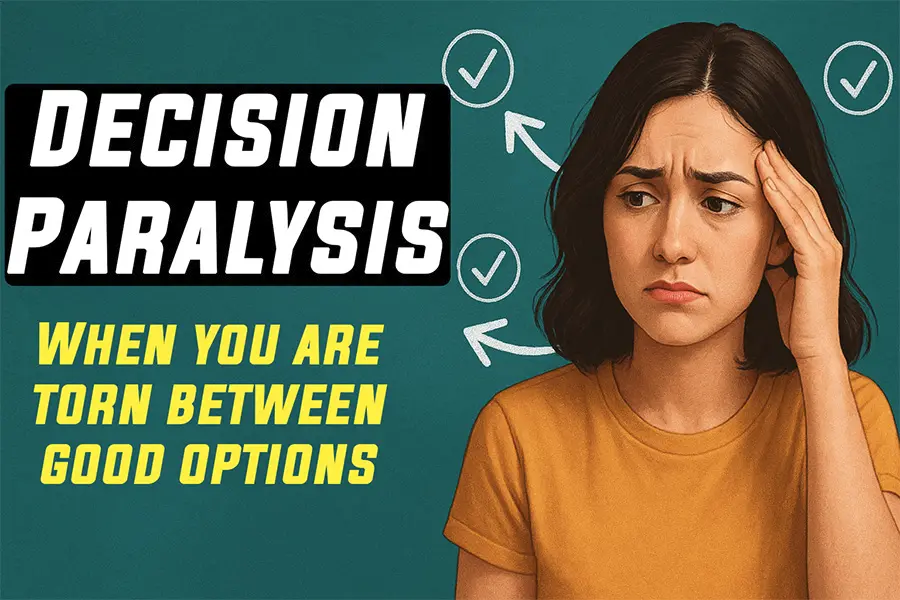










Leave a Reply